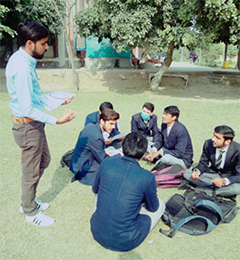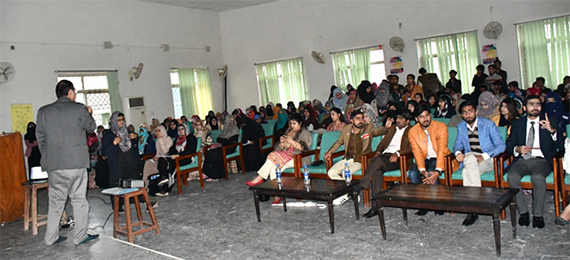
Rotaract members talk to students about thalassemia.
By Ali Raza, president of the Rotaract Club of Bahauddin Zakariya University, Punjab, Pakistan
We live in a society where people call themselves humans before they know the need of being human; where they wish for a long life before they wish for healthy life; and where they work for wealth before they work for health. But I believe being human means being responsible. And that includes not just shutting our eyes when segments of our society are suffering and need our help.
A year ago, I watched a video on Facebook about thalassemia, an inherited chronic anemia resulting from faulty hemoglobin production. In the video, a child with thalassemia is interviewed. Tears started rolling down my face as the child asked her interviewer, “is God angry with me?” and “why is Allah punishing me?” How do you answer a question like that?
I knew that I had to do something. That day, I learned about Jehaad for Zero Thalassemia, an organization working to raise awareness of the disease and encourage blood donations. They were the ones who produced the video. I joined the organization and started working with them.
In January, I was invited to their annual convention at the University of Central Punjab in Lahore. I was blessed to be among people who had been working to help people with thalassemia for years. I watched that video a second time, and my eyes again filled with tears. But this time, I was filled with resolve to continue my efforts to raise awareness.
I came back to my Rotaract Club of Bahauddin Zakariya University in Multan, and we planned a thalassemia awareness campaign. We placed colorful posters with information about thalassemia all over the city. We distributed 1,000 pamphlets to students at the University and answered questions.
We also organized a seminar, “Jehaad for Zero Thalassemia,” inviting Dr. Ali Sajid Imami, a member of the Rotary Club of Multan Cantt, to share his expertise about the nature of thalassemia and how it can be detected, cured, and prevented. He also stressed our social responsibilities regarding the disease. Students asked many questions. Participants were given passes for a free test that detects thalassemia.

Dr. Ali Sajid Imami, a member the Rotary Club of Multan Cantt, leads a discussion on thalassemia.
During the seminar, I watched the same video a third time. But this time, instead of tears, I was filled with hope because we are successfully spreading awareness about this disease. Our work is not done. But we are taking steps to end thalassemia. It feels good to be a responsible human being, to make no excuses, and to work to make the world a better place. I look forward to working with my colleagues and encouraging others as we go.
Learn more about how Rotary is fighting disease
https://blog.rotary.org/2019/04/05/rotaractors-raise-awareness-of-thalassemia/
